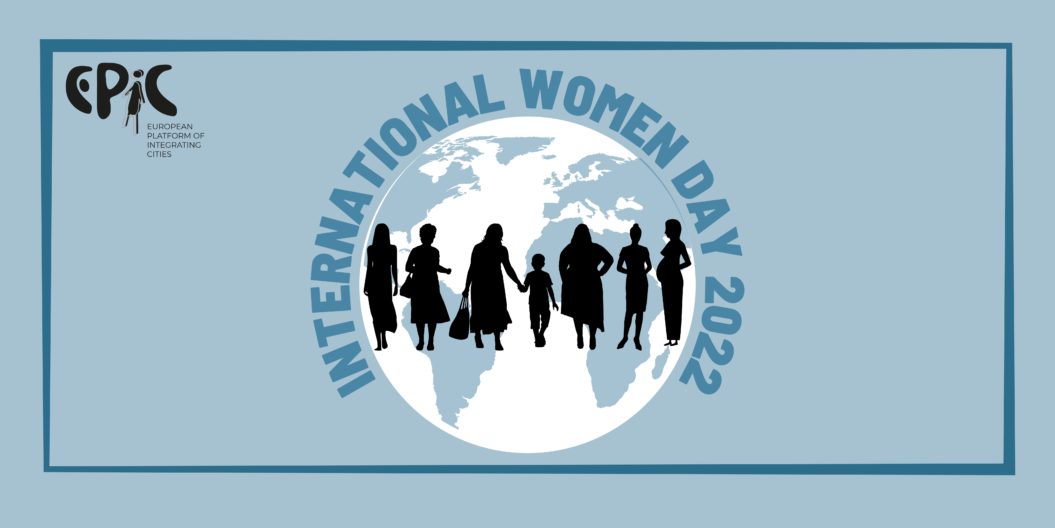
ON INTERNATIONAL WOMEN DAY 2022, WE #BREAKTHEBIAS AGAINST MIGRANT WOMEN!
March 8th, 2022
This year, one of the themes for International Women’s Day (2022) is defined by the #BreakTheBias mouvement. This hashtag calls for imagining a gender-equal world, free of bias, stereotypes, and discrimination. A world that is diverse, equitable, and inclusive; where difference is valued and celebrated. We are therefore invited to break the bias in our everyday lives, wherever discrimination against women takes place: in our workplaces, in our universities, schools, communities, etc. We all have a role to play and each individual action makes a difference.
Devoted to address the challenges of migrant integration at the local level, the EPIC project wishes to shed particular light on the different types of discrimination and prejudice against migrant women, which we need to understand if we are to provide appropriate responses. This starts with recognising migrant women as a heterogeneous group whose gender-based discrimination are manifested and founded in a variety of ways and to different degrees depending on the migration status, country of origin, age and class among others. Studying the discrimination experienced through a gender lens means putting the finger on the specific violence linked to the fact of being a woman in the migratory process.
Although women represent 52% of the migrant population in Europe (2017), they face persistent inequalities, both in their countries of origin and the EU-country of destination, in terms of access to resources, assets, education, protection, justice, labour market and decision-making processes.
A person’s gender shapes every stage of the migration experience. If historically female migration was mainly linked to family reunification, there are more and more women and girls who migrate alone. While many migrate for professional and economic reasons, a large number of women are seeking asylum for issues related to gender-based persecution: forced marriages, gender-based violence, sexual abuse, trafficking and pimping, abortion prohibition, war rape, circumcision, homosexuality and trans-identity, precariousness due to widowhood, etc.
During the journey, women also face a higher risk of vulnerability and insecurities especially when they try to reach the European continent in precarious conditions and/or when they are pregnant or responsible for children.
Upon arrival in the host country, migrant women may also face gender-based discrimination. While in principle all European countries should recognise gender-related grounds for persecution when granting asylum, in practice such persecution is not always taken into account. Reasons for this are that it is difficult to prove due to reporting biases, lack of hard evidence and psychological trauma. Moreover, their integration process and financial autonomy may be undermined by other gender inequality factors, such as limited access to the labour market, deskilling and work in the informal economy. In addition, some migrant women – particularly Muslim women who wear the veil – suffer from negative media and political coverage that portrays them as passive and victims of a subjugating patriarchal culture. These instrumental discourses of the gender equality movement fuel racism and xenophobia and reinforce the stereotypes that stigmatise them.
Gender is a key variable in the analysis and understanding of the migration phenomena. Therefore, it is crucial to develop migration, asylum and integration policies taking this perspective into consideration while acknowledging the plurality of lived histories and the intersectionality of discrimination and prejudice against migrant women. To condemn this gender-based discrimination and support migrant women, EPIC partners are joining the #BreakTheBias campaign. On this day, we stand in solidarity with these women, unite and act together for more inclusive societies that offer a safe space for migrant women, where their specific needs are taken into account and where they can benefit from equal opportunities. Our thoughts are also with the thousands of refugees, mainly women and children that are these days escaping from the ongoing attacks of Russia in Ukraine.
Watch our awareness-raising video on gender discrimination against migrant women:
At the local level, EPIC partners are also committed to raising awareness of the prejudices and inequalities faced by migrant women and to supporting initiatives aimed at empowering migrant women for a more just society.
Some examples are the projects our partner Solidaridad sin Fronteras (Solidarity without Borders) is implementing:
UP_HOLD project aims to upskill women in NEET (not in education, employment or training) aged 25+ in terms of financial competence (household economy), digital competence and entrepreneurship to enable them to enter into labour market and get out of the NEET situation.

The project aims to empower and upskill low-skilled women in situations of vulnerability in order to become more globally competitive and therefore, to boost their social and labor inclusion.
Also, the project targets to upskill professionals by equipping them with globally competent and gender-based digital tools and mentoring methodologies to improve their work with low-skilled women in situations of vulnerability and better support them.
Furthermore, the project focuses on raising awareness about gender inequalities and advancing gender equality.
BOOST – Global competence for advancing social inclusion and career paths of vulnerable women.
BOOST aims to empower and motivate women to develop their full potential and generate a concrete impact through an effective and self-sustainable training programme. It is an exciting and far-reaching initiative that could have significant opportunities for transfer right across Europe.
VOICES – Empowering women for equal participation and driving change.
It is a project aimed to help bridge the gender gap and foster women’s participation in all public and private life spheres. To achieve this purpose, women and professionals will be given a set of gender-based educational resources which are specifically designed to promote equality, promote participation and create strategies to address gender gaps.
